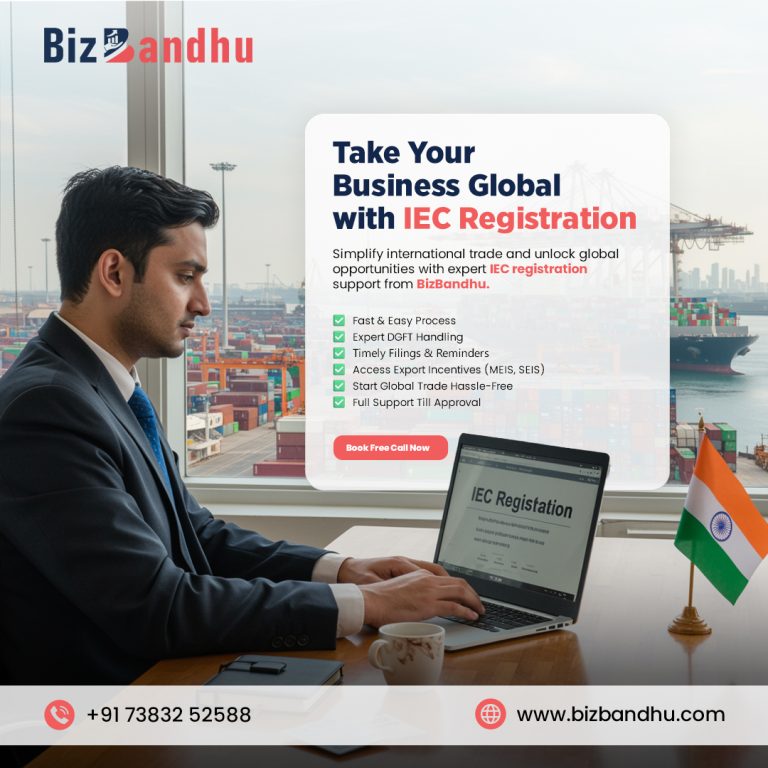IEC [Import/Export Code]
Expand your business worldwide. Apply for an IEC code from any location within India.
Do you want to Go Globally? Get your IEC Code quickly with BizBandhu
Starting @ ₹999/-
Applicable Taxes and Government Fees Extra T&C*.
Latest News & Update

Import Export Code Registration
An import-export code could be a distinctive 10-digit code that’s needed for each import/export business owner in the Republic of India. The code is issued by the Director-General of Foreign Trade (DGFT), Ministry of Commerce, and wishes no filing or renewal. IEC is needed by importers to clear customs and cargo, and to transfer cash to foreign banks. Exporters need their IEC to send shipments and receive cash from foreign banks. In short, no importer/exporter will operate in the Republic of India while not obtaining the IEC.
Benefits of Import Export Code Registration
- The IEC registration helps traders open the doors to venture into the world market, together with registration in online e-commerce operators
- Businesses will avail of government schemes just as the Merchandise Export from Asian Country theme (MEIS), the Service Export from Asian Country theme (SEIS), et al from customs and export promotion
- No compliance needs pos registration and therefore maintaining the business is comparatively easy
- The process of getting an IEC isn't tedious and may be obtained with borderline, basic documents.
Checklist for Import Export Code Registration
The documents required for an IEC registration are relatively easy to get together. Only a few documents are required, which are listed below.
- PAN Card of the company (not applicable in the case of the proprietor)
- Applicant’s PAN and Aadhaar card (driving license/Aadhaar/voter ID)
- Incorporation certificate/partnership deed
- Address proof (electricity bill/rent agreement/sale deed of the office location)
- Copy of canceled cheque leaf/banker certificate of the current account in the name of the Enterprise
- Contact Details
Our Services at a Glance
Import Export Code (IEC) – FAQs
What is an Import Export Code (IEC)?
IEC is a 10-digit unique registration number issued by the Director General of Foreign Trade (DGFT). It is mandatory for any business or individual involved in import or export of goods and services from India.
Who needs to obtain an IEC?
- Any individual, proprietor, firm, company, or LLP involved in international trade.
- IEC is required even if you export/import services (in certain cases).
- Importers need it to clear customs.
- Exporters need it to receive international payments.
Is IEC mandatory for export of services?
IEC is not mandatory for export of services unless:
- The service exporter is claiming benefits under foreign trade policy.
- The payment is received in foreign currency via authorized channels.
How to apply for IEC registration?
IEC can be applied online via the DGFT website:
https://dgft.gov.in
Steps include:
- Register on the portal
- Fill IEC application (Form ANF-2A)
- Upload documents
- Pay government fee
- Receive IEC in email within 1–2 working days
What documents are required for IEC application?
- PAN card of individual or business
- Aadhaar card or authorized signatory details
- Cancelled cheque / Bank certificate
- Address proof of business
- Digital photograph of applicant
What is the fee for IEC registration?
As of now, the government fee for IEC application is ₹500 (non-refundable). Additional charges may apply if taken through a consultant or agent.
How long is the IEC valid for?
IEC is valid for lifetime unless surrendered or cancelled. However, you must update/confirm IEC details every year between April to June, even if no changes occur.
Is there a renewal required for IEC?
No renewal is needed. But from 2021 onward, annual update (KYC) is mandatory on the DGFT portal. Failure to update may result in deactivation of IEC.
Can an individual apply for IEC without a business?
Yes. Individuals/freelancers can apply using their own name and PAN, even without a registered company.
Is IEC same as GST?
No. IEC is for international trade while GST is for domestic tax purposes. Both are separate, but DGFT may ask for GST details when applying for IEC.
Can one IEC be used for multiple businesses?
No. Each legal entity (with a unique PAN) gets one IEC only. However, you can use the same IEC for multiple product categories or trade lines under that entity.
What is the format of IEC number?
IEC is a 10-digit numeric code, generally matching the PAN number of the business entity or individual.
Can IEC be cancelled or surrendered?
Yes. You can voluntarily surrender IEC by applying on the DGFT portal. It will then be deactivated after verification.
What happens if I don’t have IEC and import/export goods?
Without IEC, you cannot clear shipments from customs or receive foreign remittances. Non-compliance may also result in penalties and seizure of goods.
Can I modify IEC details after issuance?
Yes. You can login to the DGFT portal and edit details like:
- Address
- Director/Partner info
- Bank account details
- Email or mobile number
All changes must be digitally verified.
Is DSC mandatory for IEC registration?
No, Digital Signature Certificate (DSC) is not mandatory. IEC application can be verified using Aadhaar OTP for individuals and authorized signatories.
How can I check the status or download my IEC certificate?
You can log in to the DGFT portal → Services → IEC Profile → View IEC → Download certificate in PDF format.
Is IEC required for imports/exports under personal name?
Yes, even individuals importing/exporting goods for business or profit purposes must register for IEC.
Can I use the same IEC for export and import?
Yes. A single IEC is valid for both import and export activities across all categories of goods or services.
What are the benefits of having an IEC?
- Legally enables international trade
- Required to claim export incentives or duty refunds
- Helps build credibility in foreign markets
- Required for customs clearance, bank remittances, and DGFT schemes
- One-time registration – no renewal hassles
